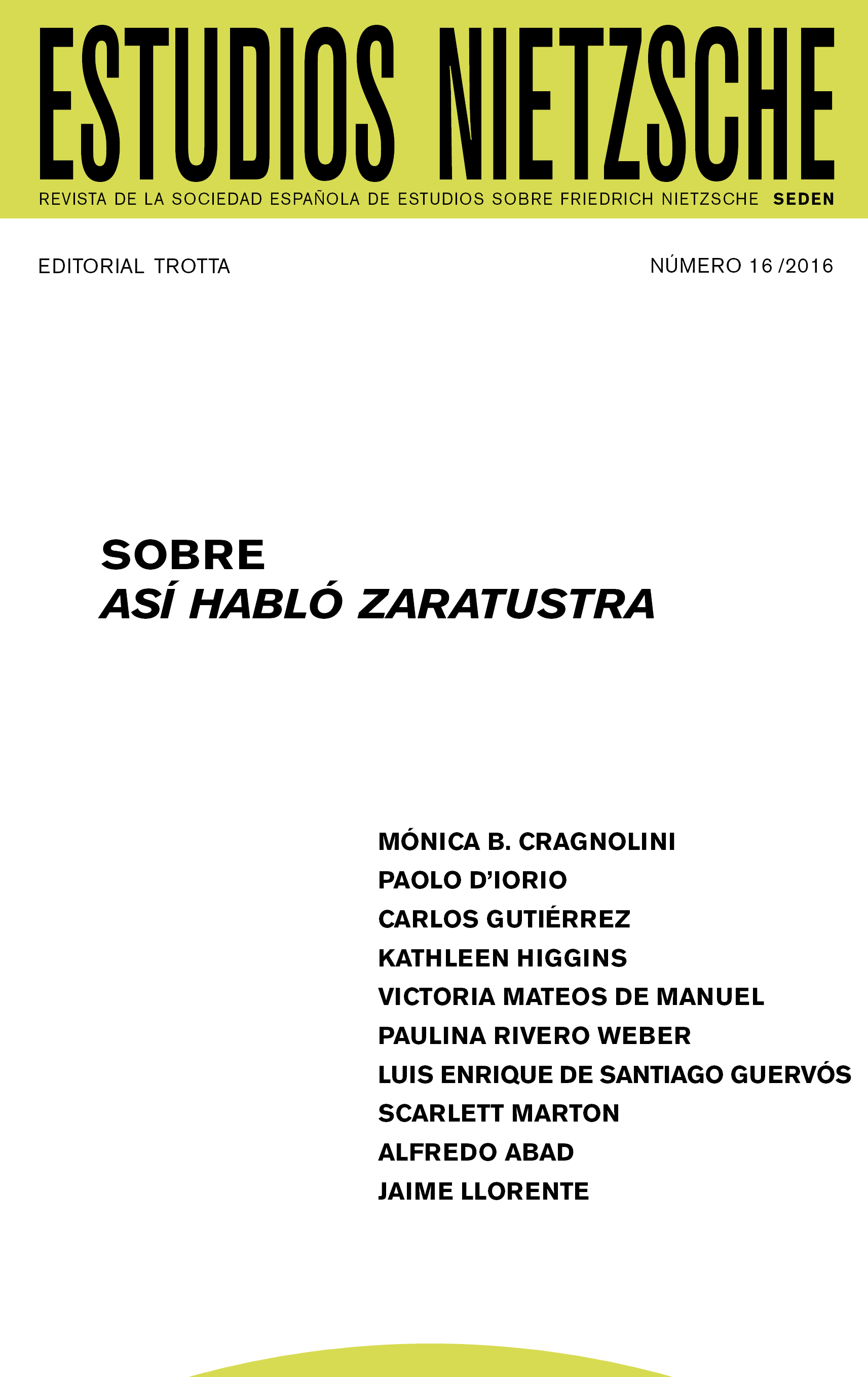Genesis, parody, and modernity in Thus spoke Zarathustra
DOI:
https://doi.org/10.24310/EstudiosNIETen.vi16.10814Keywords:
eternal recurrence, Zarathustra, parody, French readingsAbstract
The analysis of the manuscripts written by Nietzsche in Sils-Maria in the summer of 1881 gives us some precious clues concerning the genesis of Thus Spoke Zarathustra: about the relationship between Zarathustra and eternal recurrence, about the parodic nature of the figure of the Persian sage, and about the strong connection which ties Zarathustra and the philosophy and literature of Nietzsche’s time. Under the magnifying glass of the philologist and through the prism of the Nietzsche’s personal library and readings, what seemed serious and archaic becomes parodic and modern
Downloads
Metrics
References
Brusotti, Marco, Die Leidenschaft der Erkenntnis. Philosopohie und ästhetische Lebensgestaltung bei Nietzsche von Morgenröthe bis Also sprach Zarathustra, Berlin-New York: De Gruyter, 1997.
D’Iorio, Paolo, «Beiträge zur Quellenforschung», Nietzsche-Studien, 22 (1993), pp. 395-402.
D’Iorio, Paolo, La linea e il circolo. Cosmologia e filosofia dell’eterno ritorno in Nietzsche, Genova: Pantograf, 1994.
Hartmann, Eduard von, Philosophie de l’Inconscient, Paris, 1877, pp. 354-355.
Mazzino Montinari, Mazzino, La volonté de puissance n’existe pas, Paris: l’éclat, 1996.
Nietzsche, F., Obras Completas, I-IV (OC ). Director ed. Diego Sánchez Meca. Madrid: Tecnos, 2011-2016
Nietzsche, F., Correspondencia I-VI. (CO). Director ed. Luis E. de Santiago Guervós. Madrid : Trotta, 2005- 2012.
Nietzsche, F., Fragmentos Póstumos I-IV (FP). Director ed. Diego Sánchez Meca. Madrid: Tecnos, 2006-2010.
Schopenhauer, A., Parerga y Paralipomena, trd. esp. Pilar Santamaría, Madrid: Trotta, 2009.
Downloads
Published
How to Cite
Issue
Section
License

This work is licensed under a Creative Commons Attribution-NonCommercial-ShareAlike 4.0 International License.
As of issue 21 (2021) this journal is published only in open access (diamond route).
From that number 21, like the previous numbers published in NIETZSCHE STUDIES, they are subject to the Creative Commons Acknowledgment-NoComercia-ShareIgual 4.0 license, the full text of which can be consulted at <http://creativecommons.org/licenses/by-nc-sa/4.0 >
It is the responsibility of the authors to obtain the necessary permissions of the images that are subject to copyright.
This work is licensed under a Creative Commons Attribution-NonCommercial-ShareAlike 4.0 International License.
Copyright generates two different rights: moral rights and patrimonial rights that EJFB recognizes and respects. Moral rights are those relating to the recognition of the authorship. They are rights of a personal nature that are perpetual, inalienable, unseizable and imprescriptible as consequence of the indivisible union of the author and his/her work.
Patrimonial rights are those that can be derived from the reproduction, distribution, adaptation or communication of the work, among others.







11.png)
